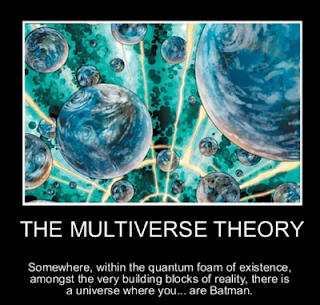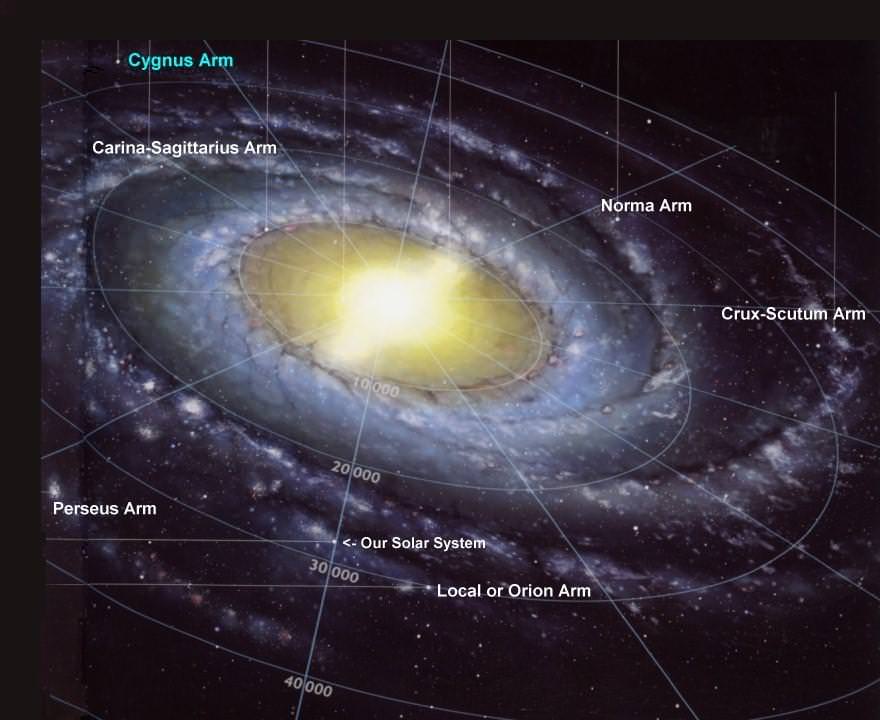Do you not marvel at the latest scientific discoveries when you hear about them? Undoubtedly, there are one of two responses that grace your mind:
"Those crazy scientists, there they go again! They keep changing their story."
or...
"Really, how interesting! So, how does this then affect [You provide the list here...].
The other day I ran across an article about a topic with which I am only nominally familiar, string theory. I teach this in my astronomy classes, but I cannot fathom the math involved. Specifically, this article talks about the possibility that, within the greater universe there are "pockets" where other universes with different laws of physics might exist. Inflation theory and string theory together predict that our universe is just one of a nearly infinite number of possible arrangements for any given universe. In essence, when speaking of "the universe", we ought to instead refer to "the multiverse".
To be sure, these ideas dwell on the border between science and philosophy, in large part because physicists just are not able to easily test these ideas at the moment, though they are certainly trying. They are looking for evidence, but they are limited by their environment. We can not see past the Big Bang or the speed of light. This is not at all an unusual position for scientists to find themselves in, albeit it can be a frustrating one. For most of human history, the band of billions of stars in our night sky that we now know as the Milky Way galaxy was just thought of as a "Milky Road" or "Milky Circle" -- a path followed by the anthropomorphized constellations, deities and heroes, through the heavens. Of course, we now know that it is something we call a galaxy, which is a huge collection of stars located within a larger group of galaxies, etc. For centuries, western philosophers and scientists had suspected that the Milky Way was a group of faint stars, but Edwin Hubble was the first to provide proof of that, in the 1920's! It took 2000 years to go from the first recorded ideas by ancient Greek philosophers to the current scientific view. In all that time, we were want of any evidence to support the idea...only scant observations by Galileo and gravitational calculations by Kant.
Today, these new discoveries seem to occur at breakneck speed. We now know that our galaxy, once a typical spiral galaxy, is now thought of as a barred spiral (Sbc) galaxy. Who knew! String theory and this idea of multiverses will be no different. It will be difficult to keep up!
We truly see very little -- "through a glass darkly" (I Corinthians 13:12) -- and not just in areas of faith. We see what is immediately around us and assume that is all there is to know. We are myopic, stuck in a box. Our faith can certainly be this way. This passage of Corinthians is one Biblical passage that has much to say about how science works: "As for knowledge, it will pass away" (verse 8); "When the perfect comes, the imperfect shall pass away" (verse 9). These words are so true. We tend to put God in a box and fail to see what He wants to show us about His creation. Ironically, it is scientists who, though they do not aim to find God, perhaps come closest to understanding the true magnificence of His creation when they push the limits of our knowledge of it. Old knowledge passes away and makes way for new knowledge. Imperfect ideas give way to something closer to a perfect understanding of creation.
When I contemplate the idea of a multiverse universe, I can not help but be floored by all of its glory and variety, and reveling in God's majesty and creative fervor, I am once again reminded of humanity's perennial myopia. We put limits on God based upon what we read in His word -- perhaps, when it comes to the natural world at least, we should allow Him some greater latitude?



No comments:
Post a Comment